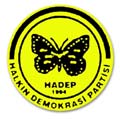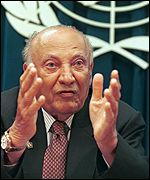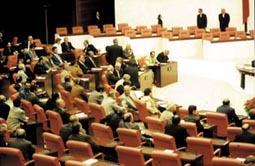5
December 2001
![]()
1. „Turkey will be responsible for all the negative consequences”, drawing attention to the aggressive policy of Turkey against the national existence of the Kurdish people in North and South Kurdistan, PKK Council of Leaders said, "In case of a war in spite of all our insistence, the Turkish Republic will be responsible for all the negative consequences."
2. „Education in mother tongue is a natural right”, Mustafa Acar, the Kurdish Institute administrator who took part in the panel "Education in mother tongue and cultural rights" organized by HADEP Diyarbakir Provincial Youth Wing, stated that demand for education in mother tongue is not racialism but on the contrary the most natural right.
3. „Cypriot leaders meet in Turkish north”, President Clerides of Cyprus will visit the breakaway northern part of the island tonight for dinner with Rauf Denktas, the Turkish Cypriot leader.
4. „Civil Code Amendment enters
final phase”, Parliament has approved the amendments to
the Civil Code's implementation and Practice Methods, forming the final
stage of the long Civil Code amendment marathon.
5. “Turkish press in November”,
the press council has announced in a report, "The Turkish Press
in November," that the numbers of unemployed, violations of freedom
of speech, imprisonments and pressure and violence against press members
had increased in November.
6. „Barzani against independent Kurdish state”, a senior Iraqi Kurdish leader said Kurds were not seeking an independent state and should not be threatened for that. Massoud Barzani, head of the Kurdistan Democratic Party (KDP), said Kurds ultimate aim was to live in a peaceful, democratic and federal Iraq.
1. – Kurdish Observer – „Turkey will be responsible for all the negative consequences”:
Drawing attention to the aggressive policy of Turkey against the national existence of the Kurdish people in North and South Kurdistan, PKK Council of Leaders said, "In case of a war in spite of all our insistence, the Turkish Republic will be responsible for all the negative consequences."
MHA - ANKARA 
Kurdistan Workers' Party (PKK) Council of Leaders warned harshly,
stating that the Turkish state has been making preparations for occupying
South Kurdistan in order to prevent developments in favor of Kurds.
The statement emphasized that an operation on Iraq would interest the
Kurdish people more than anybody, adding the following: "The efforts
of the Turkish state to repress the political-democratic struggle of
our people and to occupy South Kurdistan thereby eliminating our national
gains will give it great harms."
The Council of Leaders pointed out that the forces including Turkey which dominate Kurdistan insist on policies of denial and annihilation and replied the attempts of the Kurdish people to find a peaceful solution violently, and said with words to the effect: "The fact that the Turkish state answered our attempts for a peaceful solution with repression has recently become intensified. On one hand it makes preparations for an occupation on South Kurdistan, on the other hand it tries to stop the Kurdish democratic struggle by violent means. And there is no improvement on the life conditions of our General President, even his lawyers have difficulty to see him showing the bad weather conditions as justification."
Peaceful solution endangered
The statement emphasized that the decisions taken in the latest National Security Council (MGK) meeting showed that there would be a new wave of violence against the Kurdish people as well as the occupation of South Kurdistan. The Council continued to say the following: "The Turkish Republic seeks to repress the national struggle for liberation in both South and North Kurdistan. It means that the peaceful solution period which has developed by our President and party with great sacrifices is endangered. In case that assaults continue, this period will be put an end and war will take its place. When the war begins, it is unavoidable for both parts not to suffer loss. The interest of Turkey is to make cooperation with the Kurdish national liberation movement in both North and South Kurdistan and to give opportunity to peace and democracy. In case of a war in spite of all our insistence, the Turkish Republic will be responsible for all the negative consequences."
The Council of Leaders made the following call: "Democratic forces of Turkey should struggle for peace against war, it is vital. We call on them to struggle hand in hand to make the peace lasting, to prevent the war, and on the Turkish state to make cooperation with the Kurdish liberation movement."
Call of political serhildan
The statement emphasized the following: "The Kurdish people have the right to put the new conditions to be developed into use in order to gain its liberation. Nobody can take this right from the Kurdish people." Calling on the national forces to participate in the political serhildans (popular uprisings), the Council underscored the following: "Eliminating the risks our national gains face and gaining our national liberation is possible only by resistance on the basis of political serhildan. Therefore it is vital for the national forces to struggle hand-in-hand and to make cooperation. Those who do not act in this way cannot represent our national interest. Our party is ready to make all the necessary sacrifices on the matter, and supports the conference the Kurdish National Congress (KNK) organizes."
Reminding that where political serhildan is not sufficient, armed struggle will gain legitimacy, the statement said, "Therefore we call on the national forces to solidarity and cooperation, and on our people to serhildan resistance and our youth to participate in the defence forces."
The statement asked for the international community and
democratic public to recognize the right to have a statue in which the
Kurdish people have freedom and to make attempts to release PKK President
Abdullah Ocalan, adding the following: We call on all international
powers including USA, Britain and Russia to re-consider their stance
and on democratic public to support the struggle of our people for peace,
democracy and freedom. ![]()
2. – Ozgur Politika – „Education in mother tongue is a natural right”:
Mustafa Acar, the Kurdish Institute administrator who took part in the panel "Education in mother tongue and cultural rights" organized by HADEP Diyarbakir Provincial Youth Wing, stated that demand for education in mother tongue is not racialism but on the contrary the most natural right.
MHA - AMED 
Mustafa Acar, the Kurdish Institute administrator who took part
in the panel "Education in mother tongue and cultural rights"
organized by HADEP Diyarbakir Provincial Youth Wing, stated that the
demand for education in mother tongue cannot be related with racialism
but it is the most natural right. Seminars on the education in native
language continued in Izmir and Denizli. And HADEP Izmir Provincial
Youth Wing and students of Ege University organized a panel on the matter.
HADEP Diyarbakir Youth Wing organized a panel on native
language. Mustafa Acar from the Kurdish Institute and Muharrem Erbey
from Human Rights Association Diyarbakir Branch participated in the
panel as panellists.
Mustafa Acar emphasized on the importance of mother tongue, saying the
following: "Asking for education in mother tongue should not be
related with racialism. It is the most natural right." Speaking
in Kurdish, Acar stated that all languages are the windows of societies
and they can be observed through these windows, quoting from Confucius,
Yasar Kemal and prophet Mohamed. Acar called on the intellectuals and
youth, saying, "Kurdish intellectuals and youth have a lot of responsibility.
They should make effort to develop the Kurdish language."
And Muharrem Erbey, on his part, talked on the legal side of the publication in mother tongue. Erbey stated that Kurdish publication is limited by articles 26 and 28 of the Constitution, and reminded MHP's (Nationalist Action Party, a fascist party) statement "Kurdish is a language consisting of 600 words taken from Arabic, Turkish and Persian", saying "There can be no pure language, all languages are intercommunicated. In Turkish only 5% of the words is Turkish."
Izmir and Denizli
There were seminars on the matter in Izmir and Denizli. In Izmir HADEP Youth Wing and students of Ege University organized a panel "Education in Native Language" with the participation of 200 people. Panellists stated that mother tongue has positive influences on the development of the personality and supported the campaign launched by students for education in mother tongue..
And in Denizli panellists asked for people to support
the efforts for education in mother tongue, stating that it is a constitutional
right. ![]()
3. – The Times - „Cypriot leaders meet in Turkish north”:
FROM MICHAEL THEODOULOU IN NICOSIA 
PRESIDENT CLERIDES of Cyprus will visit the breakaway northern part
of the island tonight for dinner with Rauf Denktas, the Turkish Cypriot
leader.
It will be the first time that a serving president of the Republic of Cyprus has travelled to northern Cyprus since its occupation by Turkish troops in 1974. The visit comes after the leaders of the rival Greek and Turkish Cypriot communities met yesterday for the first time in four years.
They agreed to begin a series of face-to-face negotiations
next month in an attempt to end the island’s division before it
joins the European Union. A settlement would remove a major problem
for the EU, which is committed to including Cyprus in the next wave
of enlargement in 2004. The EU, however, does not relish the prospect
of ushering in a new member with 37 per cent of its territory still
occupied by Turkey, an aspiring member. 
“There will be no preconditions and all issues will be on the table,”
Alvaro de Soto, the United Nations special envoy to Cyprus said yesterday.
Mr Denktas had previously refused direct talks unless he was recognised
as the head of his breakaway state.
Turkey recently threatened to annex the self-styled Turkish
Cypriot state, which it alone recognises, if Cyprus joined the EU without
a settlement, even though that would wreck its own EU aspirations. Conversely
Greece, already an EU member, has said it will block EU expansion altogether
if Cyprus is not included in the next wave of candidates. ![]()
4. – Turkish Daily News – „Civil Code
Amendment enters final phase”:
Parliament has approved the amendments to the Civil Code's implementation
and Practice Methods, forming the final stage of the long Civil Code
amendment marathon.
Couples who got married before the Civil Code amendment will have the right to make an agreement on the sharing of assets and if they don't make a deal in a year's time then the new system automatically shares the assets acquired during marriage.
The new Civil Code pledges gender equality and reduces discrimination. The new civil code is expected to become official by the new year. The previous code, virtually unchanged since it was introduced in 1926, designated the man as head of the family and gave the woman no say in decisions concerning the home or children. If there is a divorce, women were only entitled to property legally registered under their names.
The new code uses plainer, more politically correct language and scraps the phrase "the head of the marriage union is the man." Men and women are given equal say while making decisions concerning the family.
Under the previous code, a woman had to seek her husband's permission to work outside the home, although a court ruling in 1994 voided that provision. The new code makes clear that a woman does not need her husband's consent to get a job.
Turkey adopted its previous code from Swiss family law, replacing the old Ottoman system which, for example, allowed a man to have more than one wife or to repudiate a wife who was no longer in favor. The 1926 code was considered revolutionary for a Muslim country when it was adopted, but it failed to keep up with the times.
Under the new code, men will be able to request alimony from their wives. A man can take his wife's surname if he wishes, while a woman can use her maiden name together with her husband's family name.
The new code raises the legal age for marriage to 18 from the current 17 for men and 15 for women. It sets a legal separation period of six months before couples can file for divorce.
The code also lowers the legal age for adopting children from 35 to 30 and allows a single parent to adopt. Out-of-wedlock offspring are given the same inheritance rights as others. It makes sex change operations harder, requiring people over 18 to prove in court that the change is physically necessary.
The new code does not mention modern issues such as surrogate
motherhood or homosexual marriages. In this predominantly Muslim country
where unmarried couples living together are still frowned upon, it also
makes no provisions for cohabiting families. ![]()
5. – Turkish Daily News – “Turkish press
in November”:
The press council has announced in a report, "The Turkish Press
in November," that the numbers of unemployed, violations of freedom
of speech, imprisonments and pressure and violence against press members
had increased in November.
The report stated that several press members working in the Milliyet and Hurriyet newspapers and CNN Turk, NTV and CNBC-E television channels, had been laid off. This situation is set to continue among writers and administrators.
In a press release on Nov. 7 by the families of death fasters in Alibeykoy, it was said that press members were not allowed to enter premises with their cameras on the order of Istanbul Police Chief Hasan Ozdemir.
Also, the Supreme Board of Radio and Television (RTUK) decided to black out the Star Television channel for 15 days, which is the heaviest penalty ever handed out to a TV channel since RTUK's establishment. RTUK decided to close Radio D for seven days and Joy FM for one day. RTUK also decided to close down Mihr TV and Mihr Radio for 365 days, which was on air in Denizli. Several incidents stated in the report:
A trial opened against journalist Nese Duzel by the Istanbul State Security Court (DGM) prosecutor following one of her interviews in the Yeni Yuzyil newspaper, which it was claimed was discriminative.
Journalist Ali Bayramoglu was acquitted at all four trials against him into several of his articles, published in the Sabah newspaper over "Operation White Energy," that were insulting to the Military.
Journalist Can Dundar was acquitted following a trail
opened by Istanbul DGM into two articles he wrote about the death fasts.
![]()
6. – Iraq Press – „Barzani against independent Kurdish state”:
DUHOK
A senior Iraqi Kurdish leader said Kurds were not seeking an independent
state and should not be threatened for that. Massoud Barzani, head of
the Kurdistan Democratic Party (KDP), said Kurds ultimate aim was to
live in a peaceful, democratic and federal Iraq.
‘’It is wrong to assail the Kurds because they seek the establishment of a federal system in a multi-party Iraq,’’ he told a gathering in the Kurdish province of Duhok. Barzani said his party, the most powerful in the semi-independent Kurdish enclave in northern Iraq, will not ‘’carry out any step that will not be in the interests of the Kurdish people.’’
He said Iraqi Kurds were still searching for a peaceful solution to their case but reiterated that ‘’federalism is a natural Kurdish right which cannot be relinquished.’’ Barzani repeated assertions that Kurds were not working for an independent state ‘’not because they do not deserve to have one but they quite understand that the situation on the international arena does not allow that to happen.’’ Barzani’s remarks came as Iraqi troops were massing in areas close to the region’s main cities and the issuing of mixed signals from President Saddam Hussein.
While calling for a dialogue, Saddam has also threatened to reoccupy Kurdish cities if the Kurdish parties turned down the offer. It was not clear whether Barzani’s remarks had anything to do with Saddam’s war and peace overtures. Previously, the Iraqi strongman rejected any hint of a multi-party and federal system in Iraq. But Barzani pledged that his party will do everything possible ‘’for the welfare of Iraq’’ but he rejected attempts to sideline the Kurdish issue.
‘’Acknowledging the issue is the only path to
spread peace and security in the region,’’ he said. ![]()